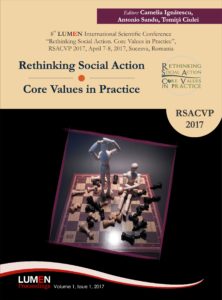A Few Considerations Concerning Latin And Slavic Influences On The Development Of Noun Inflection In Contemporary Romanian
A Few Considerations Concerning Latin And Slavic Influences On The Development Of Noun Inflection In Contemporary Romanian
Author(s): Cipriana-Elena Peica
Subject(s): Language and Literature Studies
Published by: Editura Lumen, Asociatia Lumen
Keywords: noun; Roman; Balkan; Latin; inflection.
Summary/Abstract: The Romanian language is the representative of the Latin language spoken continuously from the time of the Roman rule in the Eastern Roman Empire until today. Latin has changed, has evolved under the influence of the native populations of Dacia and the Balkan Peninsula or of the populations coming from other regions and settled in the Danube regions. All these changes are reflected in texts showing that vulgar or spoken Latin underlying the Romanian language is not different from the Latin spoken in other Roman provinces. The evolution of Latin is reflected in all areas of grammar, from the phonological system to the morphological and syntactic system. In this paper, we will focus on the influences of Latin and Slavic languages on noun inflection in Romanian; we will also focus on the reversed situation, namely on how the particularities of the Romanian language influenced, in turn, Slavic languages such as Bulgarian. Therefore, we will address two linguistic systems that are different, but which are interlinked and mutually influenced. We will refer to analytical declension, synthetic declension, articulated and non-articulated forms of nouns, and prepositions, in a desire to present a few particularities of the two linguistic systems that explain how Latin and Slavic influences are reflected in noun inflection in contemporary Romanian.
Book: Rethinking Social Action. Core Values in Practice
- Page Range: 578-586
- Page Count: 9
- Publication Year: 2017
- Language: English
- Content File-PDF

